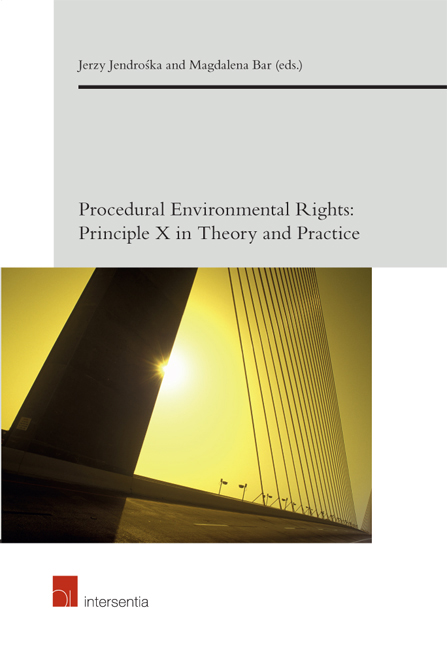Book contents
- Frontmatter
- Contents
- Introduction Procedural Environmental Rights in Theory and Practice
- Procedural Environmental Rights: Status and Developments
- Procedural Environmental Rights in Practice
- Public Participation
- Access to Justice
- Procedural Environmental Rights and Nature Protection
- Procedural Environmental Rights and EIA
- Procedural Environmental Rights and Climate Change
- (Un)comfortably Numb: The Role of National Courts for Access to Justice in Climate Matters
- Access to Information, the Hidden Human Rights Touch of the Paris Agreement?
Access to Justice in Climate Change Litigation from a Transnational Perspective: Private Party Standing in Recent Climate Cases
from Procedural Environmental Rights and Climate Change
Published online by Cambridge University Press: 12 October 2018
- Frontmatter
- Contents
- Introduction Procedural Environmental Rights in Theory and Practice
- Procedural Environmental Rights: Status and Developments
- Procedural Environmental Rights in Practice
- Public Participation
- Access to Justice
- Procedural Environmental Rights and Nature Protection
- Procedural Environmental Rights and EIA
- Procedural Environmental Rights and Climate Change
- (Un)comfortably Numb: The Role of National Courts for Access to Justice in Climate Matters
- Access to Information, the Hidden Human Rights Touch of the Paris Agreement?
Summary
ABSTRACT
Climate change litigation has grown intensively in recent years, becoming an important feature of climate governance in the US and a growing trend in some other jurisdictions. However, climate plaintiffs have traditionally encountered many procedural hurdles, including standing, which has often barred access to justice. To have standing, a party must be able to show some kind of interest in the outcome of the case, which usually stipulates the presence of a concrete injury emanating from an identifiable entity or the existing law. In case of climate change litigation, plaintiffs must thus assert actual injury from industry or state action/inaction with regard to GHG emissions and the resulting climate change, which may still be somewhat difficult from a scientific point of view. This chapter seeks to explore the current trends in private party standing in the US, Australian and European climate cases.
KEYWORDS
Access to justice; Australia; climate change; Europe; litigation; private parties; standing; United States
INTRODUCTION
Over the last three decades, the global problem of climate change has been widely discussed and recognized at the highest international level through state participation in various mechanisms, including the much anticipated Paris Agreement adopted at the end of 2015. Within the scientific circles, the consequences of climate change are commonly considered as potentially devastating and, taken at their worst, even deadly for many ecosystems and human communities alike. However, despite the growing international consensus on the necessity of abating climate change, primarily by gradually curbing the global greenhouse gas (GHG) emissions – the result of massive use of fossil fuels and the key driver for global warming – the lack of political will to address the problem in a decisive way has continued to pose a critical challenge to the objective of stabilizing the planet's climate.
The persisting inconsistencies in the regulatory response led to the rise in litigation. To date, defining climate change litigation may still be somewhat difficult, as the latter has taken many forms, including the lawsuits challenging agency permits and rules, lawsuits against governmental inaction with regard to GHG emissions, lawsuits exploring the legal avenues offered by common law and many more.
- Type
- Chapter
- Information
- Procedural Environmental RightsPrinciple X in Theory and Practice, pp. 481 - 502Publisher: IntersentiaPrint publication year: 2018



